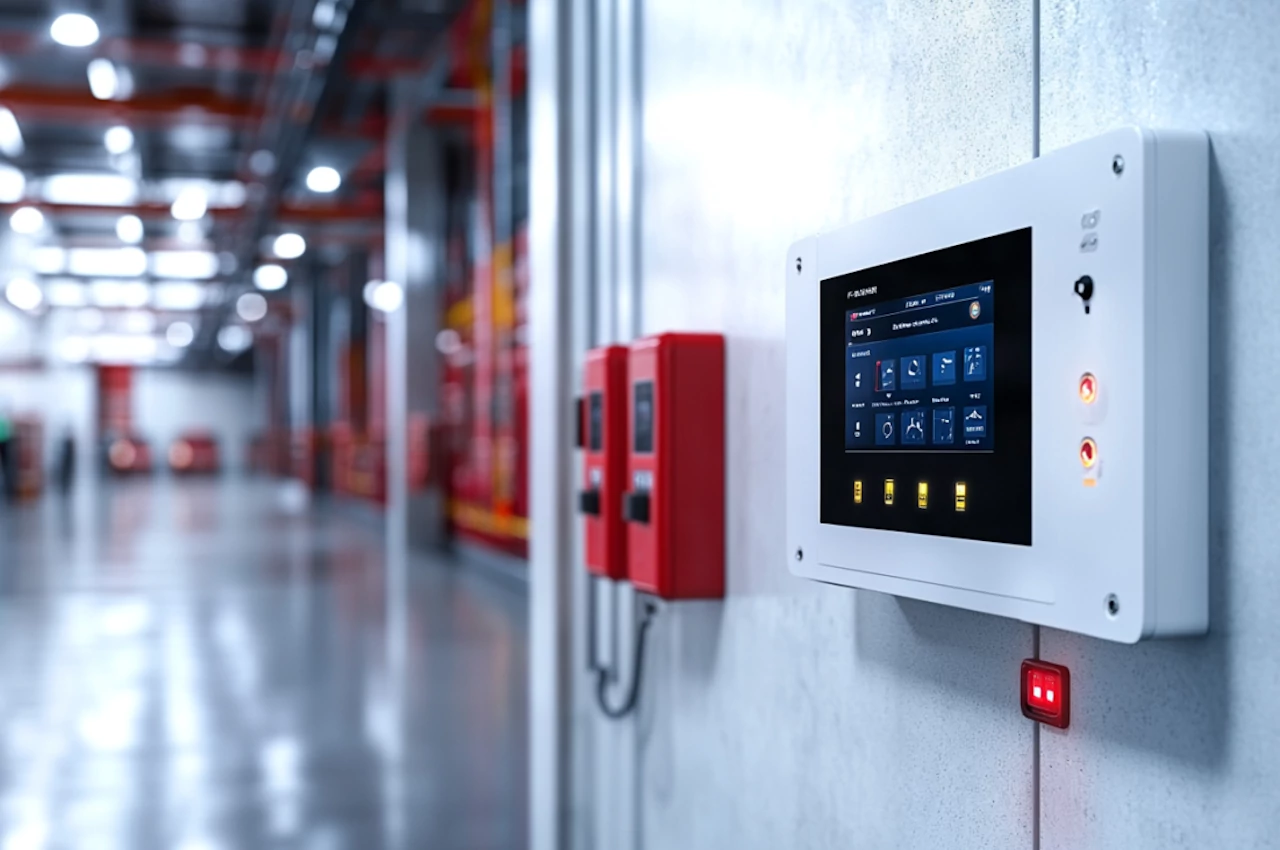Fire safety is a critical concern for industries, businesses, and communities. Fire Alarm Systems serve as the backbone of protection, providing early detection, rapid alerts, and automated responses to potential hazards. From marine environments to oil and gas operations, from commercial buildings to energy facilities, Fire Alarm Systems are essential for safeguarding lives and assets.
Atlas Technologies Corporation stands as a trusted provider of advanced Fire Alarm Systems, offering innovative solutions tailored to meet the demands of diverse industries. With decades of experience operating in challenging environments, Atlas delivers systems that ensure safety, reliability, and compliance.
What Are Fire Alarm Systems?
Fire Alarm Systems are networks of devices designed to detect fire hazards and alert occupants while enabling rapid response measures. These systems combine detection equipment, control units, and alert mechanisms to deliver efficient protection.
The main components of Fire Alarm Systems include smoke detectors, heat detectors, control panels, manual call points, alarm sounders, and visual indicators. Depending on the requirements of a facility, these systems can be conventional, addressable, or wireless.
Conventional Fire Alarm Systems use basic zone wiring, making them suitable for smaller buildings. Addressable systems allow individual device monitoring and reporting, ideal for complex facilities. Wireless Fire Alarm Systems offer flexibility and ease of installation, especially in challenging environments such as marine vessels or offshore platforms.
Why Fire Alarm Systems Are Essential
Fire Alarm Systems are vital for several reasons. First, they protect human lives by providing early warning during emergencies. Early detection allows for safe evacuation and timely intervention, significantly reducing the risk of injury or fatalities.
Secondly, Fire Alarm Systems minimize property damage by enabling fast responses before fires escalate. Businesses can prevent costly losses by addressing hazards early.
Compliance with safety regulations is another critical aspect. Many industries must meet strict fire safety standards. Fire Alarm Systems ensure these requirements are met, avoiding legal and financial consequences.
Lastly, Fire Alarm Systems help maintain business continuity. Fires can halt operations for days or even weeks. Effective fire safety systems reduce downtime and allow businesses to recover more quickly.
Atlas’s Expertise in Fire Alarm Systems
Atlas Technologies Corporation delivers Fire Alarm Systems designed for high reliability in demanding industries. With expertise spanning marine, oil and gas, building, and energy sectors, Atlas offers tailored fire safety solutions that meet rigorous standards.
For the marine sector, Atlas provides specialized Fire Alarm Systems capable of functioning in harsh offshore conditions. These systems deliver rapid alerts and integrate seamlessly with fire suppression and communication systems to ensure crew safety.
In oil and gas operations, Atlas’s Fire Alarm Systems address the unique hazards of the industry. These systems are engineered for hazardous environments, meeting compliance standards while maintaining reliability.
For buildings, Atlas offers scalable Fire Alarm Systems that protect occupants, preserve assets, and support business continuity. In energy facilities, Atlas provides integrated fire detection solutions that enhance safety and operational efficiency.
Atlas combines advanced technology, compliance expertise, and a commitment to quality, making its Fire Alarm Systems a trusted choice worldwide.
Key Features of Advanced Fire Alarm Systems
Advanced Fire Alarm Systems include several key features that ensure optimal protection and performance:
- Early Detection and Rapid Alerting: Fire Alarm Systems detect smoke, heat, or gas changes at the earliest stage and trigger alerts to occupants and emergency responders.
- Integration with Fire Suppression Systems: Many Fire Alarm Systems connect to suppression systems such as sprinklers, foam dispensers, or gas-based suppression units for automated hazard control.
- Remote Monitoring: Intelligent Fire Alarm Systems can be monitored remotely, allowing quick access to system status and alerts through smart devices or control centers.
- Reliability in Harsh Environments: Fire Alarm Systems for marine or oil and gas applications are engineered to withstand extreme conditions, ensuring consistent operation even under stress.
These features make Fire Alarm Systems essential for modern safety strategies, protecting people and property while enabling efficient response.
Fire Alarm Systems for Different Industries
Marine
Marine environments present unique safety challenges. Fire Alarm Systems designed for maritime conditions must operate reliably despite vibration, salt exposure, and humidity. Atlas delivers robust marine-grade Fire Alarm Systems integrated with communication and suppression solutions, ensuring crew safety and compliance.
Oil & Gas
Oil and gas operations face high risks due to flammable materials and remote locations. Fire Alarm Systems in this industry must meet strict regulatory standards and operate without fail. Atlas’s systems are designed for hazardous zones, ensuring rapid detection and alerting while integrating with safety protocols.
Buildings
Commercial and residential buildings require scalable Fire Alarm Systems that comply with safety codes and adapt to building layouts. Atlas delivers solutions that integrate smoke detection, alarm notification, gas monitoring, and system maintenance to protect people and assets efficiently.
Energy
Energy production facilities demand Fire Alarm Systems that integrate with operational control systems for optimal safety and efficiency. Atlas offers intelligent detection systems that support predictive maintenance and real-time hazard monitoring for energy operations worldwide.
Choosing the Right Fire Alarm System
Selecting the right Fire Alarm Systems requires careful consideration of several factors:
- Environment: Different environments have different hazards and compliance needs.
- Scale: Facility size determines the complexity of the Fire Alarm System.
- Integration Needs: Some operations require Fire Alarm Systems integrated with other safety or operational systems.
- Regulatory Requirements: Local and industry safety codes must be met.
Atlas Technologies Corporation provides expert consultation to design Fire Alarm Systems tailored to specific needs. This approach ensures reliable performance, regulatory compliance, and maximum protection.
Maintenance and Testing of Fire Alarm Systems
Regular maintenance and testing are essential to ensure Fire Alarm Systems perform when needed. Maintenance includes device inspection, system testing, battery replacement, and software updates. Testing validates system integrity and ensures compliance with standards.
Atlas offers comprehensive maintenance services for Fire Alarm Systems, including scheduled testing, performance monitoring, and upgrades. These services keep systems reliable and compliant throughout their lifespan.
Future of Fire Alarm Systems
The future of Fire Alarm Systems is shaped by innovation and digital transformation. Smart Fire Alarm Systems equipped with IoT technology offer remote monitoring, real-time reporting, and predictive maintenance. Artificial intelligence enables faster hazard detection and automated response strategies.
Integration with smart building systems enhances safety while improving operational efficiency. Atlas continues to innovate in this space, providing Fire Alarm Systems that meet modern safety demands and prepare industries for the challenges ahead.
Takeaway
Fire Alarm Systems are more than safety devices — they are critical tools for protecting lives, property, and business continuity. Atlas Technologies Corporation offers advanced Fire Alarm Systems designed for the unique needs of marine, oil and gas, building, and energy industries. These systems deliver reliable performance, compliance, and peace of mind.
When safety matters most, Atlas is the partner you can trust for Fire Alarm Systems that protect, respond, and perform.
FAQ — Fire Alarm Systems
Q1: What is the primary purpose of Fire Alarm Systems?
Fire Alarm Systems detect hazards early and alert occupants and emergency responders, helping prevent injuries, property damage, and operational downtime.
Q2: What are the main types of Fire Alarm Systems?
The main types include conventional, addressable, and wireless systems, each suited for different environments and facility sizes.
Q3: How often should Fire Alarm Systems be tested?
Testing frequency depends on regulations and system type, but most systems require at least annual testing. High-risk environments may require more frequent inspections.
Q4: Can Fire Alarm Systems integrate with other safety systems?
Yes, modern Fire Alarm Systems often integrate with fire suppression, gas monitoring, and building management systems for comprehensive safety coverage.
Q5: How does Atlas ensure the reliability of Fire Alarm Systems?
Atlas uses advanced engineering, compliance expertise, and rigorous testing to design Fire Alarm Systems that deliver dependable performance in all environments.







